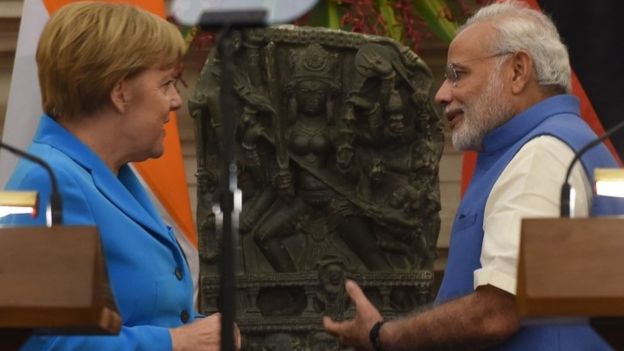India and Germany have signed agreements for furthering cooperation in the field of Science & Technology. The Union Minister for Science & Technology and Earth Sciences Dr. Harsh Vardhan and the German Federal Minister for Education and Research Ms. Johanna Wanka signed the main agreement and witnessed signing of another agreement by the officials for the purpose after mutual discussions in New Delhi today.
The deal was agreed during German Chancellor Angela Merkel’s talks with Indian Prime Minister Narendra Modi on the opening day of her visit to India.
Mr Modi visited Germany in April where he sought to convince more industries to begin manufacturing in India.
Last year, he launched the “Make in India” campaign to boost manufacturing at home and create millions of jobs.
Chancellor Merkel, accompanied by a large delegation of ministers and senior officials, arrived in the Indian capital on Sunday night and was accorded a ceremonial welcome at the Presidential Palace on Monday morning, Sep 05.
At the meeting held before the 3rd Indo-German Consultative meeting, both the Ministers expressed their satisfaction on the level of Indo-German Science & Technology cooperation which is now recognised as one of the strategic pillars in the overall bilateral relationship.
It was reiterated by both sides that they would continue to support and strengthen the basic research component of collaboration which will underpin future technology developments.
India is investing approximately 14 million euro for the construction of an additional beam line and access to the synchrotron facility at PETRA-III in DESY at Hamburg. Similarly, India is equity share holder with investment of 36 million euro in the construction of the international “Facility for Antiproton-Ion Research” (FAIR) at Darmstadt. Both these state of art facilities will further enable our scientists to conduct high impact and frontier research in material science, nuclear and high energy physics. On the same model, Dr. Harsh Vardhan offered Germany to participate in some of the future mega science projects, which India will be embarking upon.
A major highlight of the meeting was the agreement on both sides to extend the bi-national Indo-German Science & Technology Center (IGSTC) beyond 2017 with increase in funding from 2 million euro to 4 million euro every year. This was a reflection of the common endeavour on both sides to support industrially relevant R&D projects that have potential to generate novel technologies and new intellectual property in sectors such as advance manufacturing, embedded systems & ICT for automobiles, renewable energy, food security, clean water and health care technologies- all of which are in tune with present national missions of the government of India. India is the only country with whom Germany has such a bilateral R&D Centre dedicated to promote applied and industrial R&D. The Centre is already supporting 15 joint projects and pro-types of some new technologies have been co-developed in solar-thermal energy, stress tolerant chic-pea variety, and high altitude cold resistance plants etc.
Dr. Harsh Vardhan expressed confidence that the extended tenure of Indo-German Science & Technology Centre (IGSTC) until 2022 along with doubling its financial resources will enable us to co-develop affordable technologies that can contribute to the knowledge economy of both our countries.
Both the Ministers reiterated the need for concerted effort to promote exchanges of young scientists and student researchers. To this end DST through a Letter of Intent agreed to continue the support for participation of 25 Indian science and medical students to the annual Nobel Laureate meet in Lindau.
Both the Ministers echoed that the future cooperation should focus on programs to promote innovation and techno-entrepreneurship by linking the SME and Start-up enterprises of both the countries in order to make meaningful contribution to the knowledge economy and use the tools of science and technology to address socially relevant challenges. New areas such as anti-microbial resistance and regenerative medicine, earth science system including monsoon studies and marine sciences required to understand the climate change process was emphasised by the Indian side that needs to be addressed together.
